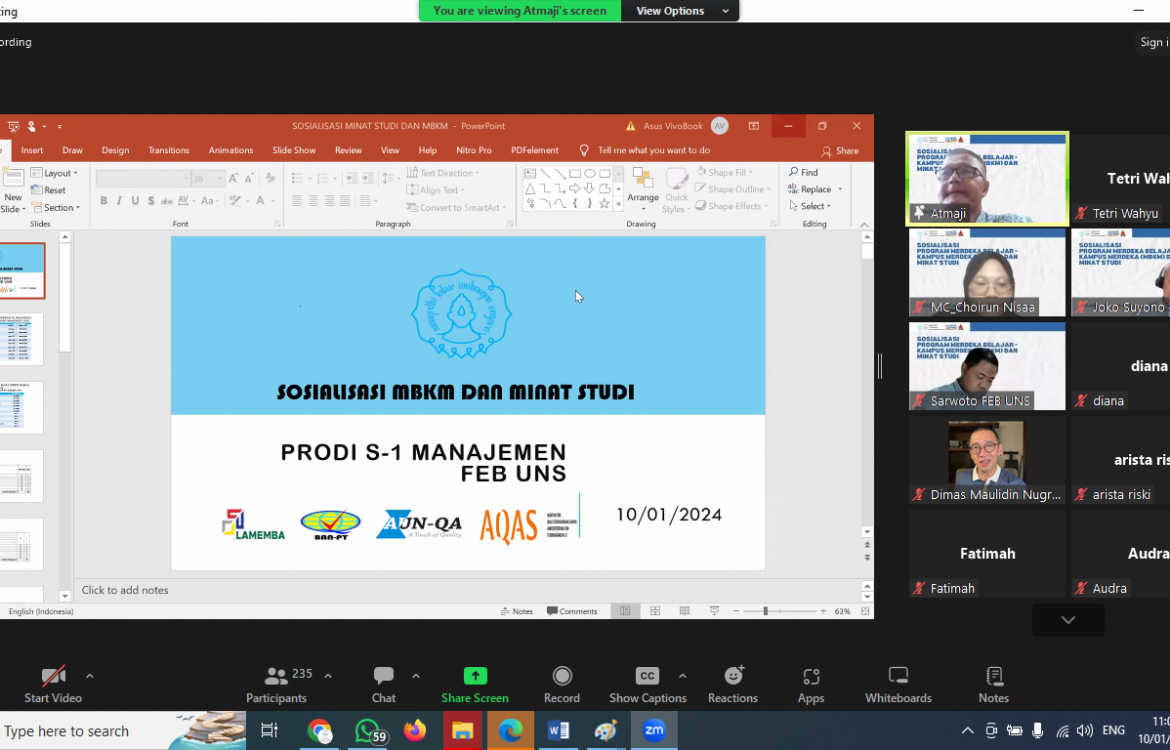
More than 200 Students Participated in the MBKM Dissemination Held by the Undergraduate Management Study Program
The Management Study Program, Faculty of Economics and Business (FEB), Universitas Sebelas Maret (UNS), organized a Dissemination session for the Merdeka Belajar Kampus Merdeka (MBKM) Program for students, virtually, on Wednesday, January 10, 2024.
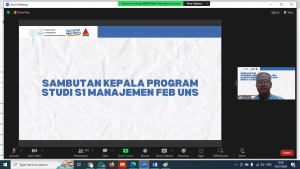 The Study Program requires students of the Study Program in 2021 and 2022 to actively participate in the MBKM dissemination session. The study program also opens opportunities for students from different years if they want to join.
The Study Program requires students of the Study Program in 2021 and 2022 to actively participate in the MBKM dissemination session. The study program also opens opportunities for students from different years if they want to join.
The Interim (plt) Head of the Management Study Program, Dr. Atmaji, M.M., in his remarks, said that this dissemination is expected to provide detailed information and insight, either for the Coordinator of MBKM, lecturers, and especially for students in their 5th semester and further.
According to him, this dissemination is very important because based on previous experience, with this dissemination, it turns out that many students of the Undergraduate in Management Study Program are interested in participating in MBKM.
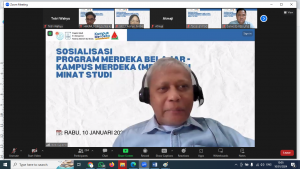 “We are proud because with you joining MBKM it means that you are courageous enough to take quite a big challenge, but on the other hand, with MBKM Program, I am sure you will have more experience. Alhamdulillah, based on previous experience, many students in the Undergraduate in Management Study Program were interested, there are around 50% of students participated in MBKM. Hopefully, there will also be many who are interested in various fields of MBKM,” he said motivating.
“We are proud because with you joining MBKM it means that you are courageous enough to take quite a big challenge, but on the other hand, with MBKM Program, I am sure you will have more experience. Alhamdulillah, based on previous experience, many students in the Undergraduate in Management Study Program were interested, there are around 50% of students participated in MBKM. Hopefully, there will also be many who are interested in various fields of MBKM,” he said motivating.
The dissemination activity was divided into two sessions, namely the MBKM Material session delivered by Dr. Joko Suyono, S.E., M.Si., Coordinator of MBKM, and Study Interest Material by Dr. Atmaji, MM.
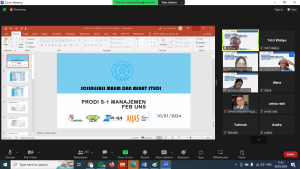 Starting the presentation, Dr. Joko Suyono quoted the statement of Minister of Education and Culture, Nadiem Anwar Makarim, MBKM is giving freedom and autonomy to educational institutions, and independence from bureaucratization, lecturers are freed from convoluted bureaucratization and students are given the freedom to choose their fields of interest.
Starting the presentation, Dr. Joko Suyono quoted the statement of Minister of Education and Culture, Nadiem Anwar Makarim, MBKM is giving freedom and autonomy to educational institutions, and independence from bureaucratization, lecturers are freed from convoluted bureaucratization and students are given the freedom to choose their fields of interest.
As further explained, so far we know that there are 2 curriculum paths, the conventional curriculum has four study interests, namely the study of Marketing Management, Financial Management, Operations Management, and HR Management. For the most part, many activities are carried out on campus, although there will be many courses that bring the industrial world to campus.
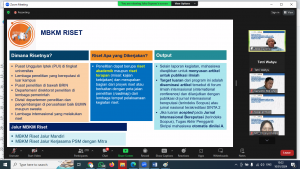 Then for the second track, students get the opportunity to study off-campus for one to two semesters, equivalent to 20 semester credits for one semester.
Then for the second track, students get the opportunity to study off-campus for one to two semesters, equivalent to 20 semester credits for one semester.
“MBKM, the keyword is the freedom or autonomy of universities, faculties, and study programs. In this case, including lecturers and students, the keyword is to choose a preferred field. Therefore, the students are given the opportunity to study off-campus to choose certain areas to sharpen or even study other fields needed in the business world or the business world,” he explained.
The Undergraduate in Management Study Program strives to implement the MBKM policy. MBKM in the Undergraduate in Management Study Program aims to improve graduates’ competency in an effort to strengthen links and matches with the business world and the industrial world.
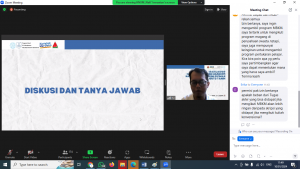 According to him, there is currently a gap between what the business world or the industrial world needs and what is learned on campus. To reduce the gap, several in-depth material options are offered related to certain areas beyond those taught by the study program.
According to him, there is currently a gap between what the business world or the industrial world needs and what is learned on campus. To reduce the gap, several in-depth material options are offered related to certain areas beyond those taught by the study program.
There are 8 areas of MBKM that students can choose from, namely Industrial Internships, Research, Entrepreneurship, Village Projects, Humanitarian Projects, Independent Projects, Teaching Assistance, and Student Exchange.
To implement the MBKM Program, the Head of Management Study Program has appointed eight lecturers to help become the person in charge of each MBKM field with one lecturer as the MBKM Coordinator.
In the next session, material regarding study interests is described in detail by Dr. Atmaji. All students were given the opportunity to discuss or ask questions related to the material that had been delivered by the two speakers.

